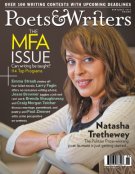By the time Ray showed up to work with me one-on-one on his thesis project, he’d already made significant strides as a writer. The work was no longer as clouded with overwrought descriptive language. The descriptions were still very dense, sometimes too dense, but he’d learned to couple that density with real physical urgency in the story action to always keep things moving and purposeful, no matter how heavy the language became. He did still tend to ram his black-and-white, good-versus-evil themes and messages through a little too hard, but I could see that by peeling back the language he had found the subject matter that was most essential to him and about which he felt a genuine urgency to write: basketball, life on and off the res and along the Montana Highline, hard living, true love, violent family life, and alcoholism, and through all of this an insistent pursuit of, or longing for, some kind of spiritual lightness, purity, and transcendence. I no longer felt that the stories were intended to persuade me to share his moral perspective; instead the stories felt inspired and illuminated by a moral vision that was essential to him and thus to his characters, and which consequently I couldn’t help but admire and feel moved by. When I asked him what had happened, he said simply, “I paid attention. A lot of it was talking to other students after class at the bar, going over stuff from class. I listened. And I realized I had to work a whole, whole lot harder.”
During our time together we discussed many or most of the stories that later comprised his hugely successful, prizewinning debut collection, American Masculine, which was published in 2011 by Graywolf Press. Not many first books of stories have done as well in recent years. That Ray managed to write most of that book during his MFA years with us is probably the most astonishing thing I’ve ever witnessed in my years of teaching and stands as a model for successful and effective teaching and learning. Could he have done as well alone? I have real doubts, but of course it’s possible. I am certain that progress of any kind would have required that someone read and respond critically to his work. I’m also sure that without something analogous to the structure and intensity of attention he received from our program, the process would have taken him many years longer.
I learned to expect Ray to show up for our thesis meetings with a legal pad full of questions about whatever story of his we were discussing, and I learned to expect that he would ask every single one of those questions, all the while methodically and patiently taking notes, flipping back and forth between his notes and questions. The first round of questions would be followed up with a second, as he dug ever more persistently into the most sensitive and uncomfortable problems his stories faced. Rather than resisting or defending the material if I suggested something radical—or defined for him how certain story elements failed or alienated me as a reader—Ray asked more questions to understand better why I’d had these responses. He had a dispassionate, clinical curiosity about this. “Tell me just a little more about that, if you would—what you mean when you say…” was a familiar refrain. I also learned to expect full-blown revisions of each story addressing everything we’d gone over, within weeks of talking to him.
Despite our notable cultural and aesthetic differences, it became apparent that my responses to Ray’s work were valuable for him precisely because of those differences; my responses could show him how to reenvision, reshape, and recalibrate his prose and his more message-heavy leanings so as not to exclude a reader like me. As it turned out, just by tuning in to the work and being honest and thorough in my own responses to it, modeling all the advice I always give in workshop, I in fact became an “ideal reader” for Ray. I also learned to expect our sessions to end with a lot of tough questions about my own writing—what was I working on, what problems was I facing, how was I integrating the writing work with family and everything else going on in my life. This seemed to matter a lot to him, which was unusual. He’d share, in kind, some of his own struggles to carve out writing time and to keep it balanced with a full-time teaching job and a busy family life. In one conversation it came out that he was rarely sleeping more than a few hours a night.
Ray’s stories got better and better. He had some solid bites from good literary quarterlies, and soon a few acceptances. When he brought in a draft of the story “When We Rise,” I knew he’d really broken through to a new level and come into his own as a writer, and that my role as teacher was just about done. I remember feeling something as I read the story’s first sentence, a kind of pleasure and awe as the sentences continued to build and build without a misstep. As a teacher, there is really no more pleasurable moment than this. I knew the best thing I could do for him would be to get out of the way. Not long after, he brought me another excellent story, “Mrs. Secrest.” It was all there, but had no ending, or had the wrong ending. He later reminded me that my advice was to pay attention to the characters to find the ending. Something like, “It’s perfect right up to here. Now you need an ending. So just write the ending and don’t fuck it up, because that’s about all you could do to wreck the story at this point.” I don’t remember saying that, but I don’t doubt that I did.









